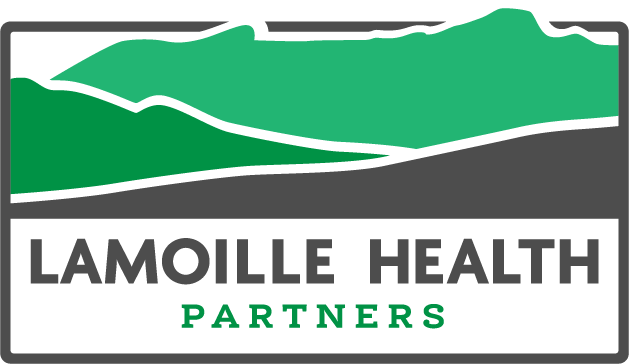By Hannah Ancel, Director of Community Health Integration
Judy Garland said it best in the 1939 film, “The Wizard of Oz.” There’s no place like home. It’s a phrase that resonates with so many of us, particularly older adults.
According to a recent survey by AARP, more than three-quarters of adults age 50 and older say they want to remain in their homes as they age. This number has been consistent for more than a decade.
The idea of “aging in place” means to have health needs and health-related needs — like safety, food, and transportation to doctor’s appointments — well taken care of while living in your own home instead of a nursing home or assisted living residence. For many older adults, independence, familiarity, and comfort are their main reasons to want to stay in their homes.
But making the decision to age in place often requires some careful evaluation and planning to ensure health and safety. Many will enjoy support from family, friends and community, including Lamoille Health Partners.
Here are four factors for older adults and their loved ones to consider when planning to age in place:
Safety
Some of the most important features to consider when it comes to remaining at home in your later years, when physical limitations may become a barrier, is ensuring the house has a bathroom on the main level, as well as a room on the first floor that could be used as a bedroom. The National Safety Council and the National Institute on Aging also suggest a few small changes seniors can consider to make their homes safer for independent living.
Ideas include:
- Clearing your floor by removing clutter, small furniture, pet gear, electrical cords and anything else that might be a tripping hazard.
- Avoiding area rugs and making sure all carpets are fixed firmly to the floor.
- Rearranging or removing furniture so there is plenty of room for walking, especially if you use a cane, walker, or wheelchair.
- Installing grab bars near toilets and in the bathtub or shower.
- Putting essential items where they are easy to reach.
- Placing light switches at the top and bottom of stairs and installing light-sensing night lights throughout the home.
- Installing a ramp with handrails at the front entrance to the home.
Older Vermonters with limited income can get assistance with home modifications by clicking here for the Vermont Center for Independent Living, or by calling 802-229-0501.
Nutrition
Your body changes as you age, and so do basic nutrition requirements. Additionally, certain medicines can also change how food tastes, make your mouth dry, or take away your appetite.
To stay healthy as you age, older adults should:
- Get adequate calcium for strong bones. Aim for 3 calcium-rich foods and beverages a day. Dairy is a great source or try some fortified cereals and fruit juices, dark green leafy vegetables, canned fish, and fortified non-dairy milks.
- Get enough vitamin D. That can be tricky in Vermont because one source of vitamin D is from the sun, so talk to your doctor or dietitian about a vitamin D supplement. Food sources include fatty fish, such as salmon, eggs and fortified foods and beverages.
- Choose protein foods. Besides meat, you can choose eggs, canned tuna or salmon, beans and chilis, and dairy foods.
- Some adults older than 50 may not be able to absorb enough vitamin B12. Fortified cereal, lean meat and fish and seafood are sources of vitamin B12. Ask your doctor or a dietitian if you need a vitamin B12 supplement.
- Stay hydrated and drink plenty of liquids.
In addition, physical and/or health limitations may make it harder for you to shop, cook or feed yourself. If it’s hard to get out to the store to shop, ask a friend or family to bring you a healthy meal a few times a week. Meal delivery programs bring hot meals into your home, and some of these programs are free or low-cost.
Transportation
While continuing to drive as you age can help you stay independent and mobile, the risk of being injured or killed in a traffic crash increases as people get older, according to the Centers for Disease Control and Prevention. The agency recommends that older adults always discuss any medical issues with their physician to determine if it might affect their ability to drive.
You may want to consider potential alternatives to driving, such as asking a family member or friend for a ride to the grocery store, pharmacy or doctor’s appointments, or using public transit or ride-share services. In the Lamoille County area, older residents can receive rides through Rural Community Transportation or by calling 802-748-8170.
If you are driving yourself, the CDC suggests several steps you can take to stay safe on the road, including:
- Wearing your seat belt and never driving impaired by alcohol, drugs, or medicines.
- Having your eyes checked by an eye doctor at least once a year and wearing glasses or corrective lenses as directed.
- Planning your route before heading out.
- Only driving during daylight hours and good weather, if possible.
Health
As you age, it may become harder to manage your medications and follow your doctor’s care plan. The good news is that a variety of technologies are now available, at relatively low cost, to remind you when it’s time to take your next dose. Special pill boxes also allow you or someone else to set out your pills for an entire week at a time.
If you’re having trouble remembering what the doctor told you to do, try to have someone go to your appointments with you. Your companion can write down everything you are supposed to do. If you are by yourself, ask the doctor to put your recommendations in writing.
In addition, technology tools like tablets that respond to your voice and medical alert systems can provide increased independence for older adults and peace of mind for family caregivers. These systems have evolved dramatically in the past decade and new options are hitting the market all the time.
Your mental health is just as important as your physical health and similarly can change as you age. If you find yourself feeling more depressed or anxious it is important to bring it up with your primary care provider and consider getting support for a mental health provider. If you or anyone you know is experiencing a mental health crisis please call the Crisis Line at 802-888-8888.
Lamoille Health Partners is here to help older adults maintain their health as they age. Our Family Medicine physicians are specially trained to prevent and manage older adults’ unique health concerns. They provide both primary care services and comprehensive geriatric assessments for patients and their families, developing care plans that address the special healthcare needs of older adults. We focus on the complete individual, including social and psychological issues as well as medical conditions.
Our Community Health Team has also helped older adults and families in Lamoille County by connecting patients with the social and financial services that make aging in place possible. The team works with patients to provide support around transportation needs, nutrition services and offers care coordination after emergency room visits to ensure proper follow-up care is provided. Many supportive services are available through the Central Vermont Council on Aging or by calling the Senior Helpline at 1-800-642-5119.
Additional assistance with coordinating and connecting to services can be provided by Support and Services at Home.
Talk to your Lamoille Health Partners doctor today about your health needs as you age.

